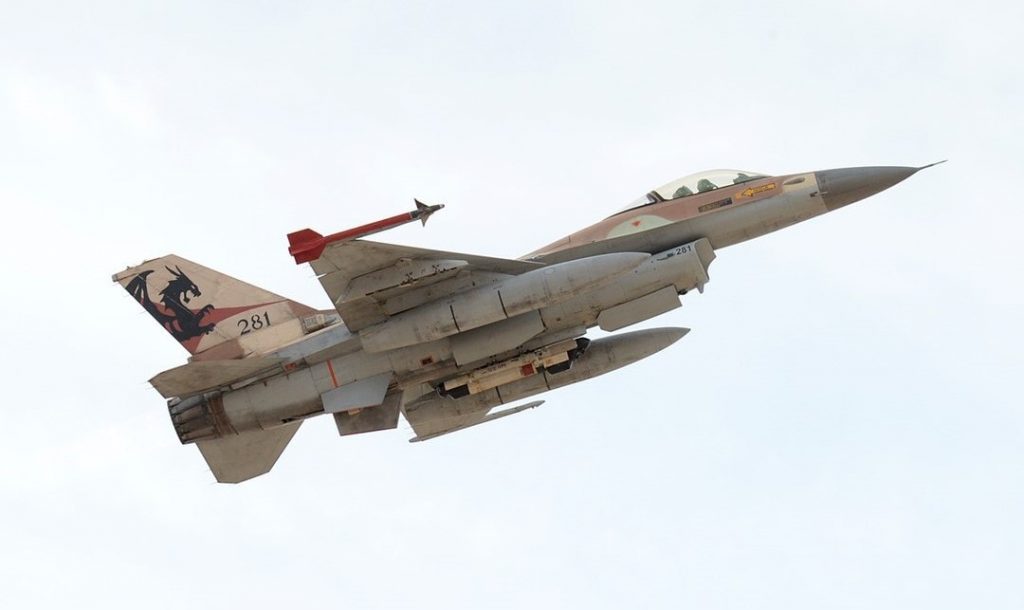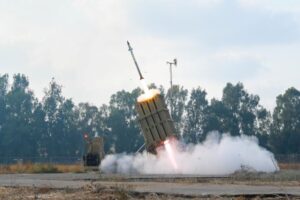
As 2019 draws to a close, a major military clash between Israel and Iran seems inevitable. Tehran is intent on establishing a menacing military presence in Syria; Jerusalem is equally determined to prevent Iran from building a lethal war machine on Israel’s border. What comes next?
The IDF continues to bomb Iranian targets in Syria, but has mostly avoided wide-ranging strategic assaults. Iran warned that it will no longer accept Israeli strikes and vowed to respond forcefully, but has not yet delivered. Sooner or later, one of the sides will take action that triggers massive retaliation.
One move that could provoke war is an Israeli campaign to hit Iranian targets in Iraq. IDF Chief of Staff Aviv Kochavi just issued a stark warning to Iran that this is about to happen.
In a rare public speech, Kochavi said that arms are flowing from Iraq into Syria, and cautioned that “we cannot allow this to happen.” The army chief reinforced the message by pledging to strike beyond Israel’s immediate surroundings to counter Iran’s military buildup.
“Iran was not an immediate enemy in the past, “Kochavi told a conference at the Interdisciplinary Center Herzliya. “Today, it is an immediate enemy.”
The Russian Factor
Meanwhile, Iranian war planners are considering a major strike on Israeli targets. A senior adviser to Supreme Leader Ali Khamenei said that Israel will come to regret its assaults in Syria. This threat should be taken seriously.
The IDF has been on alert for long weeks in preparations for an Iranian offensive. This remains the case, as Air Force Chief Amikam Norkin made clear at a recent military ceremony . “While we stand here, all squadrons are on high alert, air defense batteries are deployed at the borders, and the entire Air Force is on alert and ready,” he said.
Both Israel and Iran possess considerable firepower, but will likely aim to limit hostilities once a clash erupts. For Iran, this would mean focusing on military targets and avoiding strikes on civilians deep in Israeli territory. In Jerusalem, officials will carefully consider whether to strike targets in Iran.
However, regardless of Israel’s and Iran’s wishes, a miscalculation could provoke a deadly chain reaction of punches and counter-punches. Heavy casualties or unacceptable damage on one or both sides could easily push them into an all-out war.
The two sides may be counting on Russia’s influence to ensure that events do not spiral out of control. Moreover, Moscow has much to gain by positioning itself as the ultimate mediator and keeping both Tehran and Jerusalem indebted.
Notably, Russian officials have taken a harder line on the IDF’s bombing campaign in Syria as of late. It remains to be seen whether President Putin intends to press Israel to limit or end its military activities. If he does and Israel refuses, the situation will become even more volatile, with the US possibly joining the fray as well.
Syria As Bargaining Chip?
Despite wishes to contain the situation, Israel and Iran may discover that this is a difficult task. For Iran, entrenchment in Syria is a key component of an ambitious regional strategy. For Israel, the Iranian effort poses an unacceptable threat.
Moreover, Tehran cannot afford to convey a sense of weakness while it copes with unrest at home and with anti-Iran protests in Lebanon and Iraq. “Iran has some scores to settle, and the list of incidents that require a response keeps growing,” Arab affairs expert Shimrit Meir wrote in daily newspaper Yediot Aharonot.
Meir estimates that Iran will indeed retaliate, but stresses that Israel will have to continue its military campaign in Syria regardless. “If Israel fails to find the strength and resourcefulness, despite the political impasse, to eliminate the Iranian project in Syria, it will end up surrounded by missiles with another Lebanon on its northeastern border.”
Given the scope of the threat, the likelihood that Israel will step back from a confrontation is slim. While Iran is also unlikely to buckle, there is one scenario that could see an Iranian withdrawal.
As it faces a debilitating domestic crisis, the Islamic Republic may decide to use Syria as a bargaining chip in its regional chess game. An Iranian offer to withdraw from Syria in exchange for lifting the sanctions against it would pose a difficult dilemma for both Israel and the US.
However, even if officials in Tehran take this route, they will aim to boost their negotiating position by reinforcing Iran’s destructive potential. This, too, will require Iran to engage Israel militarily.


